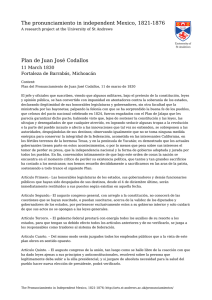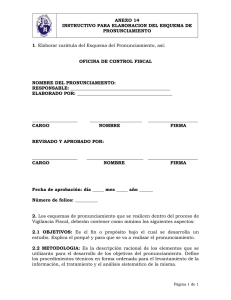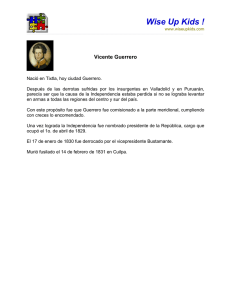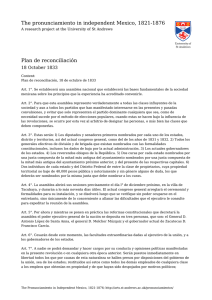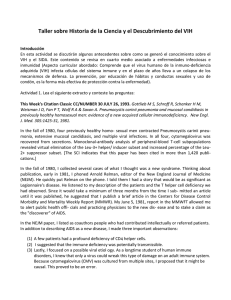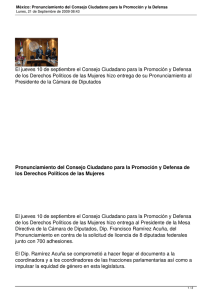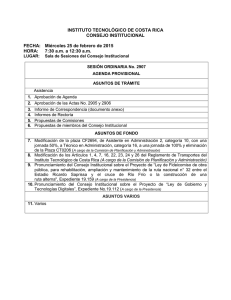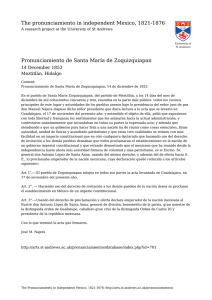Pronunciamiento y Plan de Jalapa
Anuncio
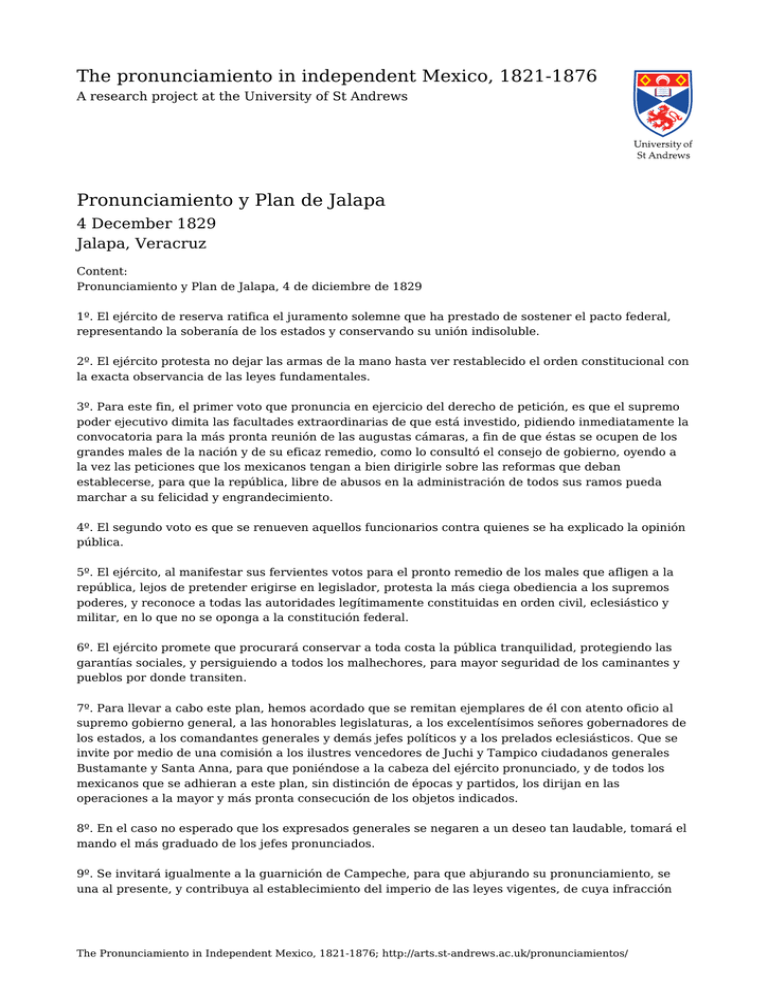
The pronunciamiento in independent Mexico, 1821-1876 A research project at the University of St Andrews Pronunciamiento y Plan de Jalapa 4 December 1829 Jalapa, Veracruz Content: Pronunciamiento y Plan de Jalapa, 4 de diciembre de 1829 1º. El ejército de reserva ratifica el juramento solemne que ha prestado de sostener el pacto federal, representando la soberanía de los estados y conservando su unión indisoluble. 2º. El ejército protesta no dejar las armas de la mano hasta ver restablecido el orden constitucional con la exacta observancia de las leyes fundamentales. 3º. Para este fin, el primer voto que pronuncia en ejercicio del derecho de petición, es que el supremo poder ejecutivo dimita las facultades extraordinarias de que está investido, pidiendo inmediatamente la convocatoria para la más pronta reunión de las augustas cámaras, a fin de que éstas se ocupen de los grandes males de la nación y de su eficaz remedio, como lo consultó el consejo de gobierno, oyendo a la vez las peticiones que los mexicanos tengan a bien dirigirle sobre las reformas que deban establecerse, para que la república, libre de abusos en la administración de todos sus ramos pueda marchar a su felicidad y engrandecimiento. 4º. El segundo voto es que se renueven aquellos funcionarios contra quienes se ha explicado la opinión pública. 5º. El ejército, al manifestar sus fervientes votos para el pronto remedio de los males que afligen a la república, lejos de pretender erigirse en legislador, protesta la más ciega obediencia a los supremos poderes, y reconoce a todas las autoridades legítimamente constituidas en orden civil, eclesiástico y militar, en lo que no se oponga a la constitución federal. 6º. El ejército promete que procurará conservar a toda costa la pública tranquilidad, protegiendo las garantías sociales, y persiguiendo a todos los malhechores, para mayor seguridad de los caminantes y pueblos por donde transiten. 7º. Para llevar a cabo este plan, hemos acordado que se remitan ejemplares de él con atento oficio al supremo gobierno general, a las honorables legislaturas, a los excelentísimos señores gobernadores de los estados, a los comandantes generales y demás jefes políticos y a los prelados eclesiásticos. Que se invite por medio de una comisión a los ilustres vencedores de Juchi y Tampico ciudadanos generales Bustamante y Santa Anna, para que poniéndose a la cabeza del ejército pronunciado, y de todos los mexicanos que se adhieran a este plan, sin distinción de épocas y partidos, los dirijan en las operaciones a la mayor y más pronta consecución de los objetos indicados. 8º. En el caso no esperado que los expresados generales se negaren a un deseo tan laudable, tomará el mando el más graduado de los jefes pronunciados. 9º. Se invitará igualmente a la guarnición de Campeche, para que abjurando su pronunciamiento, se una al presente, y contribuya al establecimiento del imperio de las leyes vigentes, de cuya infracción The Pronunciamiento in Independent Mexico, 1821-1876; http://arts.st-andrews.ac.uk/pronunciamientos/ proceden los males generales de la república, y las grandes miserias que aquejan al ejército mexicano. Es copia. Jalapa, 4 de diciembre de 1829. Juan María Azcárate Context: For a significant sector of the Mexican army and political class, and in particular for those former royalists, escoceses, and novenarios who had backed Manuel Gómez Pedraza’s candidacy in the 1828 presidential elections, Vicente Guerrero’s 1829 government was considered to be illegitimate, dictatorial, and worryingly radical. Guerrero had come to power on the back of the 1828 Perote-Acordada pronunciamiento cycle. He was a mulatto, moreover, and a former insurgent leader, who, according to his radical Yucatecan minister of finance, Lorenzo de Zavala, was despised and perceived as a threat because of the colour of his skin and his revolutionary past by the racist white criollo elites who had stood by the royalist “causa buena” during the greater part of the 1810-21 civil war. The fact that Guerrero had used the Spanish attempt to reconquer Mexico in the summer of 1829 to have himself awarded emergency powers and had then refused to relinquish these once Isidro Barradas’ Spanish expeditionary army had been defeated in Tampico (11 September 1829) was interpreted as evidence of his dictatorial tendencies. The radical economic policies pursued by his minister of finance had also given rise to concern. What is unquestionable is that the 1828 Perote-Acordada pronunciamiento cycle had created a particularly resonant precedent. In forcing the annulment of Gómez Pedraza’s election and the successful and forceful imposition of Guerrero, it had demonstrated that pronunciamientos could be used to force a change in government. Although the Plan of Jalapa did not explicitly call for the overthrow of Guerrero’s government, its authors were intent on bringing it down, as would become obvious once the Jalapa pronunciamiento cycle got underway. The Plan itself, launched by the Reserve Army that had been mobilised to Jalapa to support the campaign against Barradas, and which remained in the region despite the Spanish expedition having been repulsed, disguised its true intentions by avoiding to specifically call for an end to Guerrero’s government. Article 1 professed that it was the duty of the army to defend the federal pact. Article 2 asserted that all laws should be strictly abided by. Article 3, making use of the “right to petition,” demanded that the president renounce his emergency powers and that Congress was reinstated. Article 4 claimed that all those government officials whom public opinion rejected should be removed from office. Article 5 stressed, somewhat paradoxically, that the army obeyed and respected the constituted authorities. Article 6, in a similar vein, stressed that the army would ensure peace and order were guaranteed. Article 7 invited Bustamante and Santa Anna to lead the pronunciamiento (but not the government, since, as can be seen in Article 3, the president was being asked to listen and acquiesce to the petitioners’ demands by renouncing his emergency powers and reopening Congress). Article 8 provided a contingency plan in case Bustamante and/or Santa Anna refused to lead the pronunciamiento, and article 9 invited the centralist pronunciados of Campeche (see 6 November 1829 pronunciamiento) to give up their demands and join this pronunciamiento cycle. For anybody who was not aware of the pronunciados’ undeclared commitment to overthrow Guerrero’s government and bring Anastasio Bustamante and the “party of order” to power, the Plan’s demands were not obviously reactionary. They deliberately appealed to a wide range of political actors since the majority continued to back the 1824 Federal Constitution, believed in the need to guarantee the rule of law, and knew Guerrero’s use of emergency powers was unlawful and unconstitutional. Article 4 was beautifully vague as well, since it did not actually specify who those “rejected” government officials were. It would be artice 4 that would be used, unsurprisingly, once Guerrero’s government was overthrown by the end of the month, to remove Guerrero’s supporters from all positions of power, both at a national and regional level. Whilst most pronunciamientos were used to lobby the government, to forcefully negotiate with it, to make it, through initimidating petitions, change its policies, a significant number of them were, in essence, coups in disguise. The December 1829 Jalapa pronunciamiento cycle was one such coup in disguise. Its initial plan was designed to broaden its instigators’ base of support by not stating their The Pronunciamiento in Independent Mexico, 1821-1876; http://arts.st-andrews.ac.uk/pronunciamientos/ real aims. It avoided stating the obvious, and relied on subsequent events and pronunciamientos de adhesión that went on to develop further, and elaborate on, the initial demands, to bring about its real and undeclared aims which, in this case, were reduced to overthrowing Guerrero’s illegitimate radical government and bring Bustamante and his hombres de bien to power. WF http://arts.st-andrews.ac.uk/pronunciamientos/database/index.php?id=765 The Pronunciamiento in Independent Mexico, 1821-1876; http://arts.st-andrews.ac.uk/pronunciamientos/

